

How language can affect the way we think. Keith Chen (TED Talk: Could your language affect your ability to save money?)

Might be an economist, but he wants to talk about language. For instance, he points out, in Chinese, saying “this is my uncle” is not as straightforward as you might think. In Chinese, you have no choice but to encode more information about said uncle. The language requires that you denote the side the uncle is on, whether he’s related by marriage or birth and, if it’s your father’s brother, whether he’s older or younger.
Hearing Bilingual - How Babies Tell Languages Apart. Yet while many parents recognize the utility of a second language, families bringing up children in non-English-speaking households, or trying to juggle two languages at home, are often desperate for information.
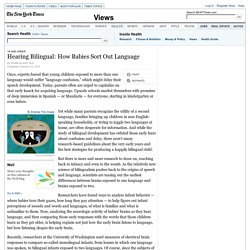
And while the study of bilingual development has refuted those early fears about confusion and delay, there aren’t many research-based guidelines about the very early years and the best strategies for producing a happily bilingual child. But there is more and more research to draw on, reaching back to infancy and even to the womb. As the relatively new science of bilingualism pushes back to the origins of speech and language, scientists are teasing out the earliest differences between brains exposed to one language and brains exposed to two. Recently, researchers at the University of Washington used measures of electrical brain responses to compare so-called monolingual infants, from homes in which one language was spoken, to bilingual infants exposed to two languages.
Enfants Bilingues - Le portail du bilinguisme des enfants. Raising bilingual children – Bilingual Monkeys. Raising Bilingual Children: The First Five Steps to Success. By Christina Bosemark, founder of the Multilingual Children's Association When I was growing up, the only way to raise a truly international child was via an exorbitantly priced Swiss boarding school.
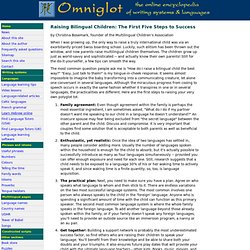
Luckily, such elitism has been thrown out the window, and now parents raise multilingual children themselves. Www.lsadc.org/info/pdf_files/Bilingual_Child.pdf. Bilingual Kids Show Cognitive Advantages. By Rick Nauert PhD Senior News Editor Reviewed by John M.

Grohol, Psy.D. on November 10, 2010 Children who know two languages tend to perform better than monolinguals on measures of attention and cognitive control. That is one of the findings in new research on bilingualism reviewed in the current issue of Psychological Science in the Public Interest, a journal of the Association for Psychological Science. Multi-tasking comes easier to bilingual kids. Credit: iStockPhoto WASHINGTON: Children who grow up learning two languages are better at multi-tasking but slower at building vocabulary than their monolingual peers, Canadian psychologists have found.
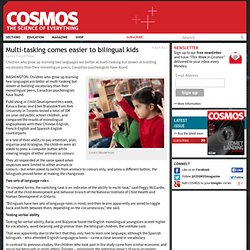
Publishing in Child Development this week, Raluca Barac and Ellen Bialystok from York University in Toronto tested a total of 104 six-year-old public school children, and compared the results of monolingual anglophones with their Chinese-English, French-English and Spanish-English counterparts. In a test of their ability to pay attention, plan, organise and strategise, the children were all asked to press a computer button while viewing images of either animals or colours. They all responded at the same speed when responses were limited to either animals or colours – but when asked to switch from animals to colours only, and press a different button, the bilinguals proved faster at making the changeover.
The Benefits of Bilingualism. SPEAKING two languages rather than just one has obvious practical benefits in an increasingly globalized world.

But in recent years, scientists have begun to show that the advantages of bilingualism are even more fundamental than being able to converse with a wider range of people. Being bilingual, it turns out, makes you smarter. Does Raising Bilingual Children Make Them Smarter ? Learning simultaneously two languages at very young age develops certain areas of the brain that are different when a second language is acquired later in life in high school or college for example.
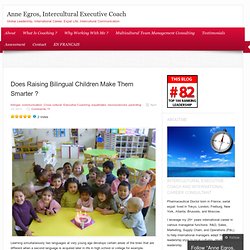
The bilingual brain has one large area for processing complex information overlapping both languages while when a second language is learned after 13 years old there are two distinct areas for each language making information processing more difficult in the second language. According to recent brain imaging studies, bilingual brain develops more densely, giving it an advantage in various abilities and skills. As a parent of a bilingual child I was afraid initially of confusion and mixing the two languages ( in my son’s case French/English). At school we have experienced 100% English curriculum and then speaking, reading, watching movies in French.
Not Just An Obnoxious Parenting Trend: Bilingual Children Are Smarter. Mothers and fathers who have their children religiously enrolled in language classes or immersion programs aren’t just participating in the swanky trend of bilingual children.
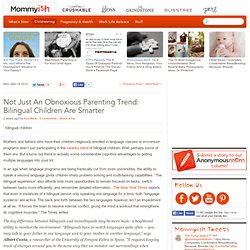
Well, perhaps some of them are. But it turns out there is actually some considerable cognitive advantages to getting multiple languages into your tot. In an age when language programs are being frantically cut from even universities, the ability to speak a second language gives children sharp problem-solving and multi-tasking capabilities. “The bilingual experience” also affords kids more opportunities to remain focused on tasks, switch between tasks more efficiently, and remember detailed information.
The New York Times reports that even in instances of a bilingual person only speaking one language for a time, both “language systems” are active.